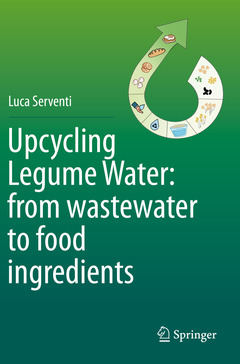Upcycling Legume Water: from wastewater to food ingredients, 1st ed. 2020
Auteur : Serventi Luca

Food manufacturing generates an incredibly high volume of wastewater. The legume industry is one of the top contributors to this environmental issue, as soaking and boiling are necessary to transform dried legumes into cooked canned products and other legume-based products, such as soymilk, tofu, hummus and flours. Wastewater must be treated prior to disposal into the environment, thus raising production costs for the food industry. In addition, wastewater contains nutrients that are lost from the food chain after disposal. As water and soluble nutrients are becoming a limited resource, it is critical to optimize food manufacturing at all levels.
Recycling Legume Wastewater Into Food Ingredients presents a sustainable solution to this increasing demand for food and water. The text analyses the composition of legume wastewater and its physicochemical properties, including its potential applications in emulsifiers, foaming agents, gelling agents and antistaling ingredients. Early chapters discuss the processing of legumes and the wastewater generation involved. Further sections focus on wastewater generated by soaking and cooking, including the composition, functional properties, and food applications involved in each. Sprouting water, bioactives and applications in edible packaging are also discussed.
In presenting a sustainable solution for legume wastewater use, this text is an important key to sustainability in food processing and the reduction of waste.
1. Introduction
1.1 Legume processing
1.2 Wastewater generation
2. Soaking Water
2.1. Composition
2.2. Functional Properties
2.3. Food Applications
3. Cooking water
3.1. Composition
3.2. Functional Properties
3.3. Food Applications
4. Conclusions
5. References
Dr. Luca Serventi is a Lecturer of Food Innovation in the Department of Wine, Food and Molecular Biosciences at Lincoln University in Christchurch, New Zealand. He is the leader of the Bachelor degree of Food Science. His research proposes sustainable solutions to develop texturizers and health-promoting ingredients while guaranteeing water security.
Presents a sustainable solution to reducing wastewater in legume processing
Discusses the composition of legume wastewater and its physicochemical properties, including its potential applications in emulsifiers, foaming agents, gelling agents and antistaling ingredients
Analyses wastewater from soaking and cooking legumes, including the composition, functional properties, and food applications involved in each?
Date de parution : 04-2021
Ouvrage de 174 p.
15.5x23.5 cm
Disponible chez l'éditeur (délai d'approvisionnement : 15 jours).
Prix indicatif 105,49 €
Ajouter au panierDate de parution : 04-2020
Ouvrage de 174 p.
15.5x23.5 cm
Disponible chez l'éditeur (délai d'approvisionnement : 15 jours).
Prix indicatif 105,49 €
Ajouter au panier